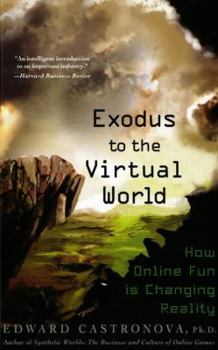Exodus to the Virtual World: How Online Fun Is Changing Reality
Select Format
Select Condition 
Book Overview
Virtual worlds have exploded out of online game culture and now capture the attention of millions of ordinary people: husbands, wives, fathers, mothers, workers, retirees. Devoting dozens of hours each week to massively multiplayer virtual reality environments (like World of Warcraft and Second Life), these millions are the start of an exodus into the refuge of fantasy, where they experience life under a new social, political, and economic order built...
Format:Paperback
Language:English
ISBN:0230607853
ISBN13:9780230607859
Release Date:November 2008
Publisher:St. Martin's Griffin
Length:256 Pages
Weight:2.00 lbs.
Dimensions:0.7" x 6.0" x 9.0"
Customer Reviews
3 ratings
A thought-provoking speculative discussion
Published by Thriftbooks.com User , 15 years ago
In Exodus to the Virtual World, Dr. Edward Castronova explores a possible future wherein participation in virtual worlds and MMOs becomes so widespread that major social effects are felt here in the real world. He suggests that as more people spend more time in virtual worlds, they will come to expect the real world to provide many of the conveniences of those virtual worlds: more fairness, more opportunity, more fun. This, he theorizes, will lead to a conflict over attention between the real and the virtual, with the real world being forced to adopt social policies inspired by game design. The author frequently suggests that game designers may be better-equipped than most to handle the social policy issues of the 21st century and beyond. As a game designer, I found this rather gratifying, though I remain skeptical whether it's actually true. However, the parallels he draws between social policy design and virtual world design are compelling, and many of the mechanics we find today in virtual worlds and MMOs are in fact elegant solutions to social issues that have yet to even be well-addressed in the real world. This book is primarily a speculative, futurist work. Many of the author's claims go largely unsubstantiated precisely for that reason: they're speculations into one possible future. I had no problem with this, and the author makes it clear up front what type of book this is. You just have to come into it with the right mindset. That said, he does frequently reference verifiable present-day facts in order to establish trends which inform his projections, making them more educated predictions than wild guesses. My only major complaint with the book is that, as the author has extrapolated the present state of virtual worlds and MMOs into a vision of future society, he's undertaken significant cognitive effort to evolve the social side of things, and spent almost no effort on the evolution of the virtual worlds and MMOs themselves. In effect, there seems to be an unstated assumption throughout the book that the design of virtual worlds and MMOs will remain largely static, and that the only variable will be the percentage of the population participating in them. But if the relatively brief history of video games shows us anything, it's that we can expect meteoric paradigm shifts in games around every 5-10 years. Relevant examples include the introduction of the first text-based MUD, the first graphical MUD, and the original Everquest. Why should we not expect similar paradigm shifts to dramatically alter the landscape of virtual worlds and MMOs in the next 5, 10, 20, even 50 years? And of course, these paradigm shifts will affect how users participate in those worlds, which will in turn affect their expectations of the real world in accordance with the author's theory. Nevertheless, Exodus to the Virtual World comes well-recommended. It's a thought-provoking read for game designers and players alike, and I'm willing to bet some politicans
Attention migration
Published by Thriftbooks.com User , 16 years ago
The central theme of Exodus is the concept of "attention migration". That is: that more and more people choose to immerse themselves in synthetic worlds (Castronova's word instead of "virtual worlds") - MMOGs (Massively Multiplayer Online Games), like Second Life and World of Warcraft. Today they have at least 16 million registered users, and the number is increasing quickly. Also, some of these synthetic worlds function like alternate societies with their own norms of conduct, citizenships, economies, codes and policies and so on. In a information society where attention is central, the increasing attention spent on synthetic worlds will (according to Castronova) create a "atmospeheric event"... Castronova writes well and he discusses this social phenomenon and it's probable future impact in an interesting way. Though at times I think the discussion becomes a little repetitive, and I can't totally agree that "real" societies will have to become more "fun" and gamelike to compete with the synthetic counterparts. But it is a fascinating thought.
Read this book
Published by Thriftbooks.com User , 17 years ago
This is a very interesting book that deserves more attention than I fear it's likely to get. The author has used his experiences with synthetic game-worlds to write a thought-provoking look at the social landscape of the future, and craft a compelling argument for the way games will influence "reality" in the years to come. The author has more game-experience than I was expecting when I picked up this book, and has avoided the easy traps and overgeneralizations that often plague writers who are attempting to explain or interpret synthetic game-worlds. This lends his thesis on the economics of fun a verisimilitude that makes even his more extreme predictions seem a likely vision of what-might-be. Not only is this a book for the interested game, but even more it's a book for the businessman, and the policy-maker, who will more and more benefit from his insight into the games people play.






